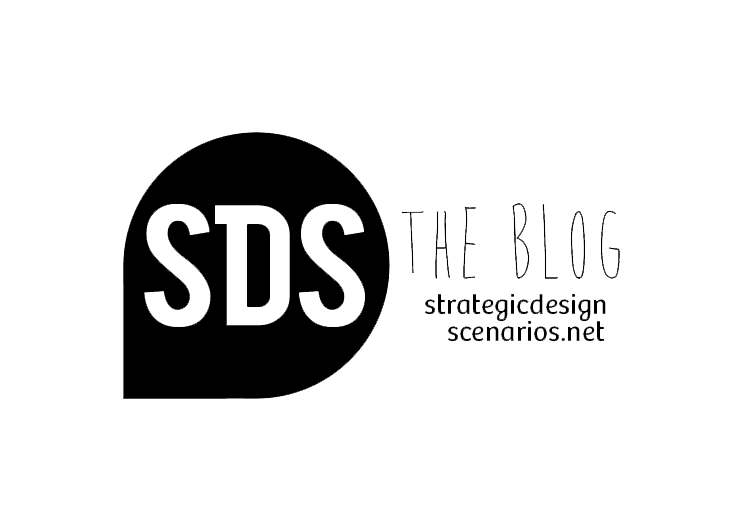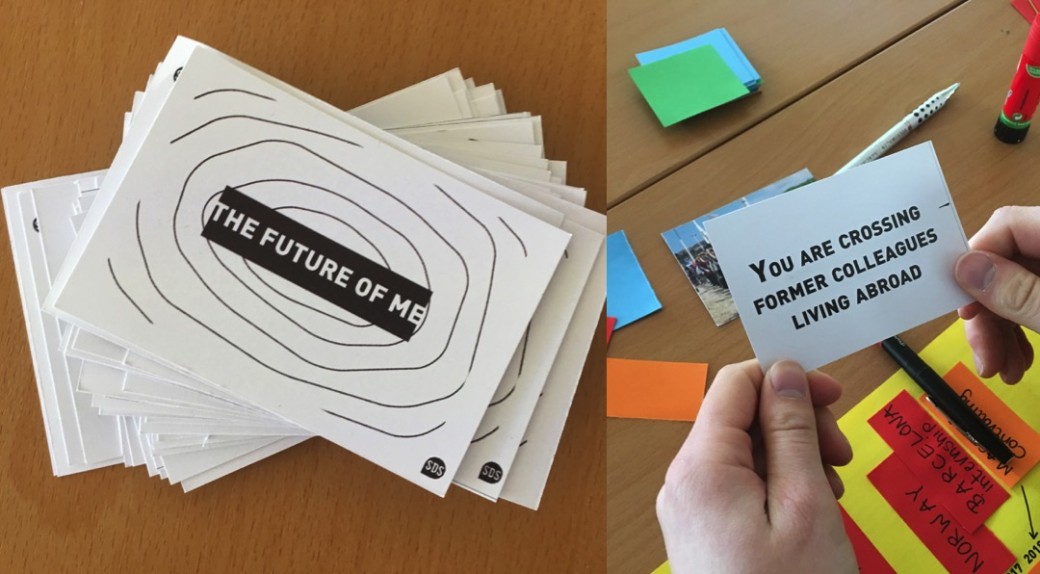THE FUTURE OF ME in a sustainable world:
a forward-looking game in which you are both the main player and the main focus!
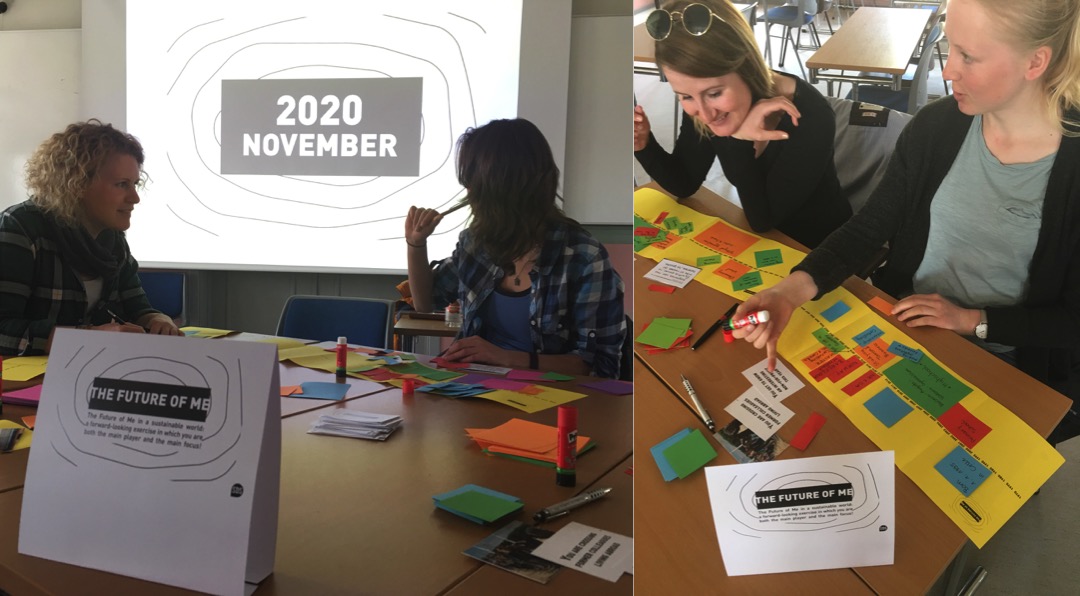

THE FUTURE OF ME IN A NUTSHELL…
The project « THE FUTURE OF ME » proposes that we think about our own future, building « self-scenarios » and discussing with ours peers. It is a means of contributing to the social conversation on the future and on necessary sustainable transition, of re-appropriating the future as an object of daily debate.
The goal is not to make a real foresight an accurate personal roadmap but to “make the future more present”, in other words to propose forward looking as a personal activity. The main result is not the accuracy or pertinence of our projections but the very fact that we will have made our first personal projection and that now (maybe) our lives will be slightly changed because we will have to take into account these projections or react to them…?
Of course we cannot know what impact this exercise may have on our careers and lives, whether it will consume a fast-paced chimera for the ones or whether it will strengthen convictions for the others. It does not matter: this is not the objective of this exercise. What can be expected, however, is that we will have reflected on our futures. All together we will have constructed pluralistic, contrasting scenarios that will undoubtedly influence each other and nurture our future conversations about our professional and personal development.
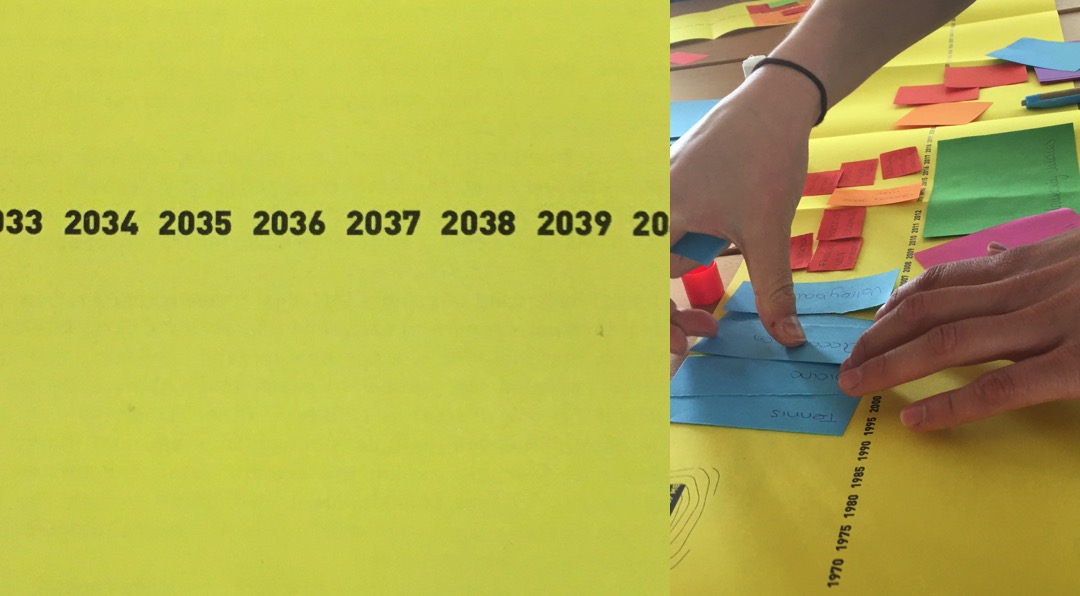

THE STORY-TELLING…
One day in an international research project on sustainable lifestyles by 2050, a table of forward looking and future experts discuss at the coffee break. One of them talks about his daughter who is going to start studying as a surgeon. Knowing that this person is a regular of future scenarios I asked him:
« Surgeon? » This is a job that changes… Think that your daughter starts studying with the image of a surgeon operating a patient and when she will be herself surgeon it is likely that most professionals operate behind computers and will nether see a patient directly of their life. What does she think? «
My friend answers me with surprise: « In fact, I did not speak of it to her… »
I reply: « Well, it’s curious: you’re one of the leading European foresight experts who lives almost in the future, and when your own daughter begins her studies for five to eight years, you do not even discuss the evolution of the profession she undertakes… «
The result is an animated discussion at the table, the main questions of which are: can one make one’s own prospective? Is it desirable to consider its own future? Should we discuss with a child what s/he might expect? Is it closing her/his future or is it an asset to guide her/his life at best?
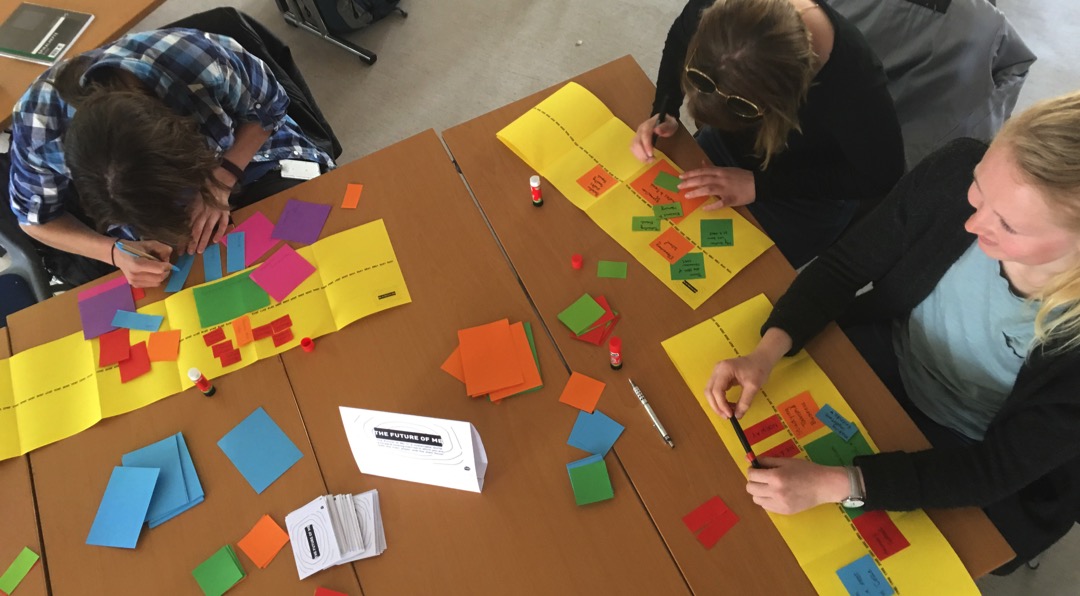
Since then, I have tried to explore this idea. I have peddled it from discussions to discussions reporting each time the reactions of my interlocutors. One can say that this idea of a personal foresight divides: some see it as oppressive, reducing the number of possibilities, obliterating the future especially if it is that of youth or children… Others claim that It is useless, that the possibilities are multiple, unimaginable and that the attempt is vain. Others, on the contrary, find the idea interesting and are amazed as I am that one doesn’t seek to anticipate its own future, to build hypotheses, scenarios to be less surprised in order to build its own strategies for more openness and self-determination…
It is a fact that the reactions of the detractors of this idea remind me curiously of the negative reactions to the prospective attitude: the future is the result of a combinatory too complex to be anticipated; what is the point of projecting oneself into the future since we can not be sure of what will happen; the future will always be richer than what the present can ever think; etc.
This litany arising from the disappointment of not being able to calculate the future with accuracy has turned away the looks at the future; the collective conversation on the future is left to the experts; the future deemed unthinkable and therefore uncontrollable is a source of anguish or hope depending on whether one is pessimistic or optimistic…
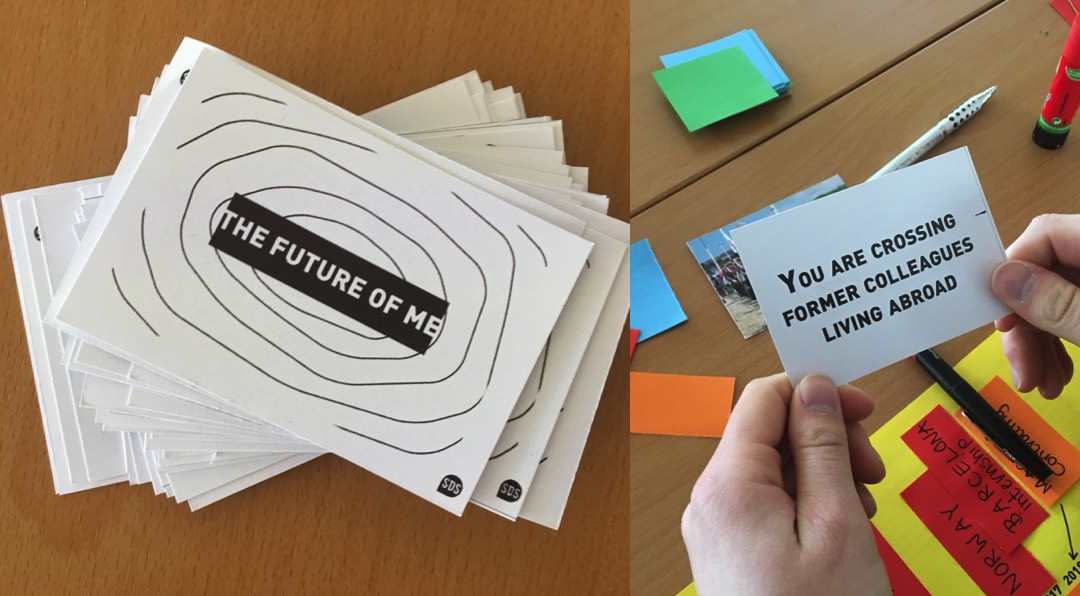
The project « THE FUTURE OF ME » proposes to everyone to think about their own future, to build « self-scenarios », to exchange with their peers, to feed the social conversation on the future, to reappropriate the future as an object of daily debate…
« THE FUTURE OF ME » is inspired by the practices developed in certain projection exercises in the future, offered to young designers and architects students to allow them to grasp the long time, take a step back, grasp a « macroscope » an imaginary apparatus, the reverse of the microscope that would allow to view from far the whole panorama rather than to look closely at the details. Among these exercises, one has always fascinated me: it consists of asking students to build their book over the next 20 years by reducing this time to a few months. The book of an architect or a designer is a sort of album containing the main projects s/he has done during his career and which testify to her/his professional experience. The exercise consists in accelerating the time: to say that a week is worth a year, to make fictitious projects one after the other, to end after a few months of work at a retrospective conference (I should say a « retro-prospective conference ») on their own future as they imagined it. A friend, a professor of design in Lyon, fond of this exercise, brought back the reaction of some of her students who were confronted with this acceleration of time: « …at the beginning of my career (sic) I began to produce projects to make myself known. But soon I got tired and reoriented my work. I looked for projects that made more sense… « .
The exercise, even in an accelerated manner, had allowed this student to experience what he imagined to be his professional goal and to realize after a few weeks of repeated projects that this objective seemed to him to be vain, that he had enough and that he had preferred to change.
Of course we cannot know what impact this exercise will have on its real professional career, whether it will save time by consuming a fast-paced chimera or whether it will have strengthened him in its convictions and that it will persist in this direction. It does not matter: this is not the objective of this exercise. What can be expected, however, is that this student will have reflected on his future. The whole class together will have constructed pluralistic, contrasting scenarios that will undoubtedly influence each other and nurture their future conversations about their professional and personal development.
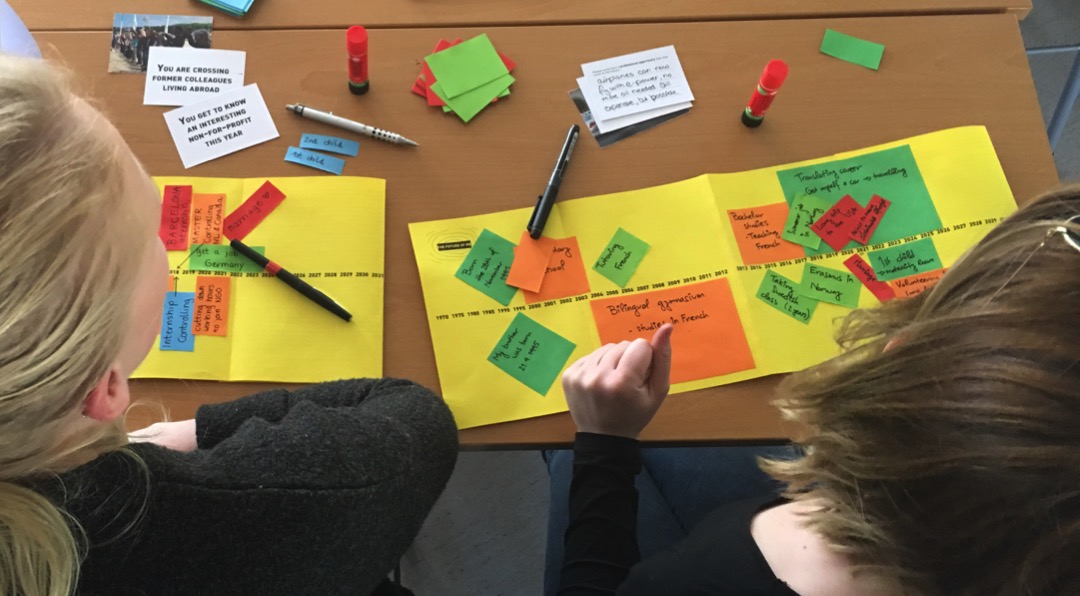
 THE RULES OF THE GAME
THE RULES OF THE GAME
The goal of « THE FUTURE OF ME » is not to make a real foresight or an accurate personal roadmap but to “make the future more present”, in other words to propose forward looking as a personal activity. It is a card game with no winners and no losers. The issue is not the accuracy or pertinence of the projections but the very fact that players will have made their first personal projection and that afterward (maybe) their lives will be slightly changed because they will have to take into account these projections or react to them…?
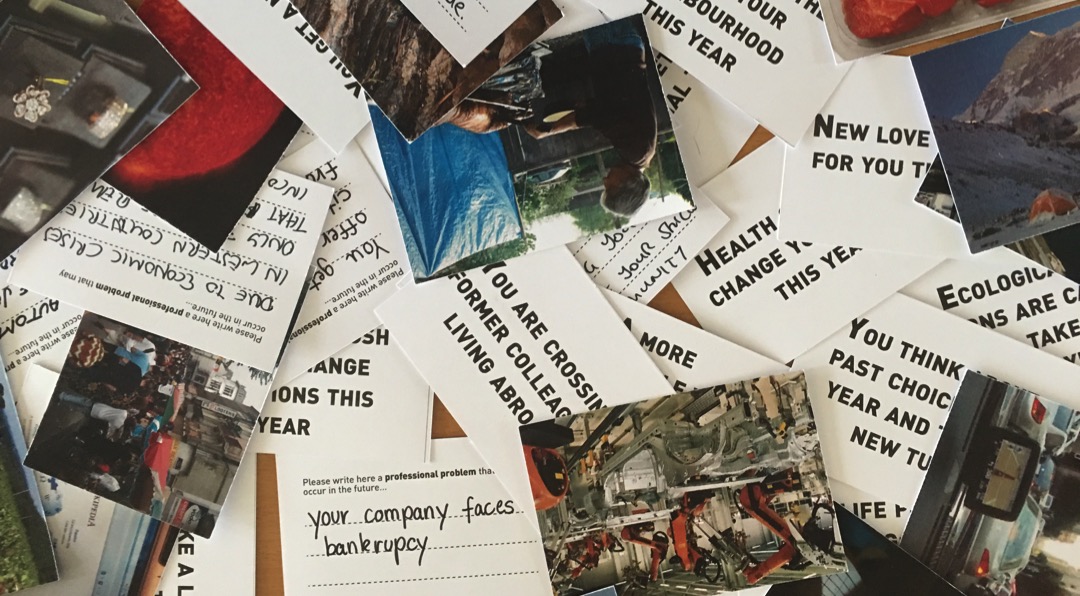
The game lasts a couple of hours during which personal time is accelerated: two minutes worth a year. A clock projected on the wall scans the months and years that pass in accelerated.
On the table there is a deck of cards turned upside-down. These are « stimulation cards » meant to stimulate participants all along the projection process with “soft” inputs: the aim is to help them in this difficult projection exercise imagining their future but not to influence them with too strong or explicit inputs that would frame their projection too much. The deck of cards is a random mix of three sets of cards
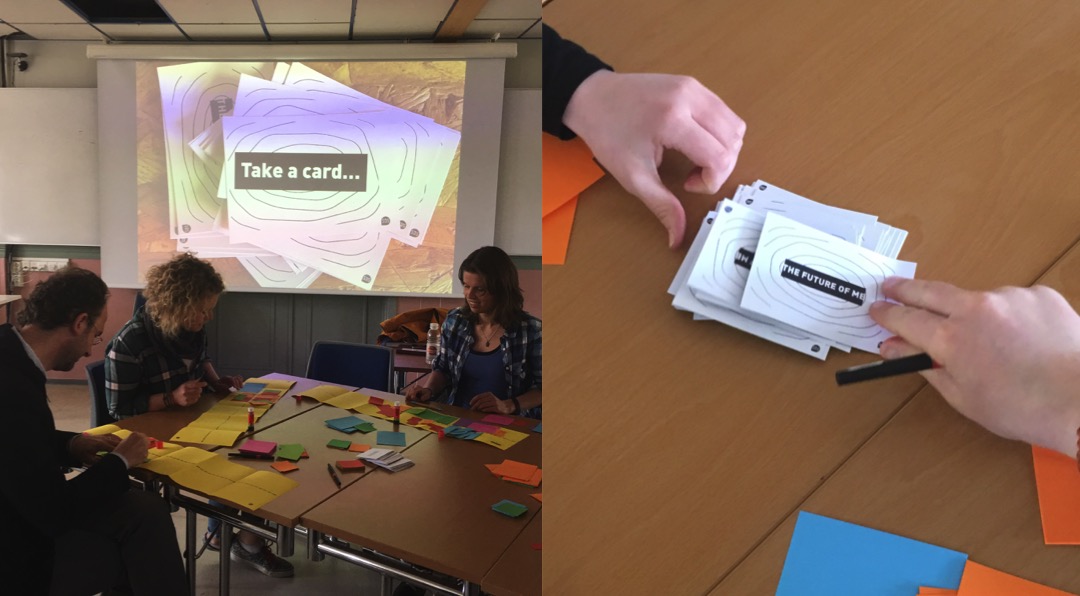
– a series of pictures showing a « bit of everything » just as “mind stimulations” to bring randomly various topics in their minds that otherwise they would not think about in a workshop room
– a series of simple life events formulated in an open way, a bit as a fortune teller would do to keep interpretation open (i.e. “a big change occur in your family”; “you have a job opportunity this year” ; “you make a long trip abroad” ; etc.)
– a series of blank cards to fill before the game starts. Each participant will receive two cards: one where to write a job opportunity that may occur in their future and the other one where to mention a job problem they are afraid of. All these new cards will be mixed with the other and make the game more specific with positive and negative forecasts in the very field of the participants.
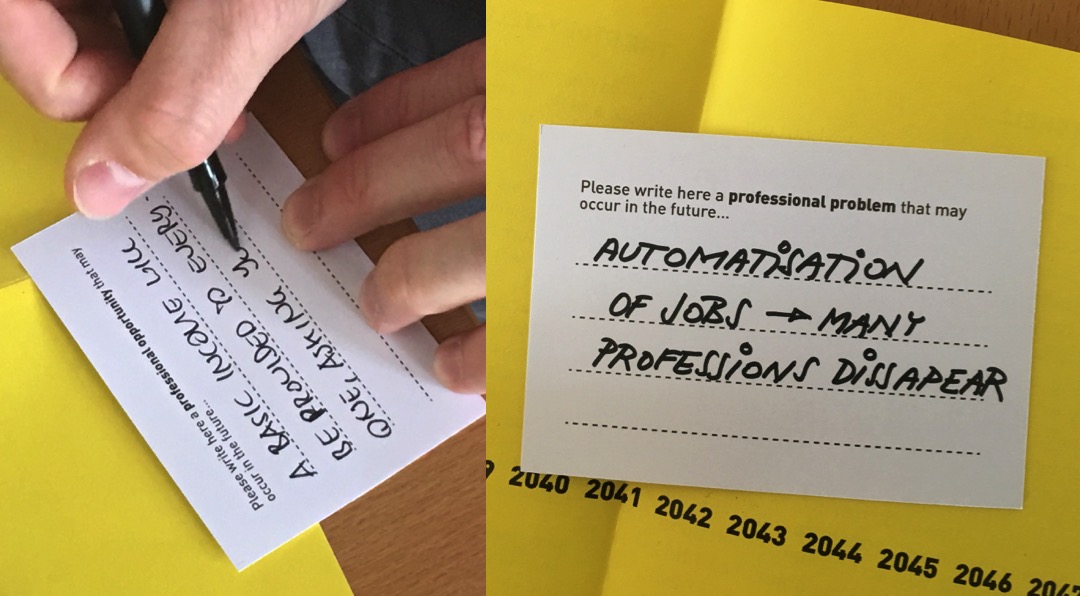
Participants receive each their own timeline: a long stripe of paper with a time scale starting a couple of decades ago and, year by year reaching 2050… They starts filling them with their name, they indicate their birth dates and describe some key events they choose to mention from their past (i.e. changes in their families, school experiences, etc.). Participants start with what they know and become confident with the exercise. Then the minutes-years clock start and they keep the momentum. They go on filling in their present and in the first years of their futures.
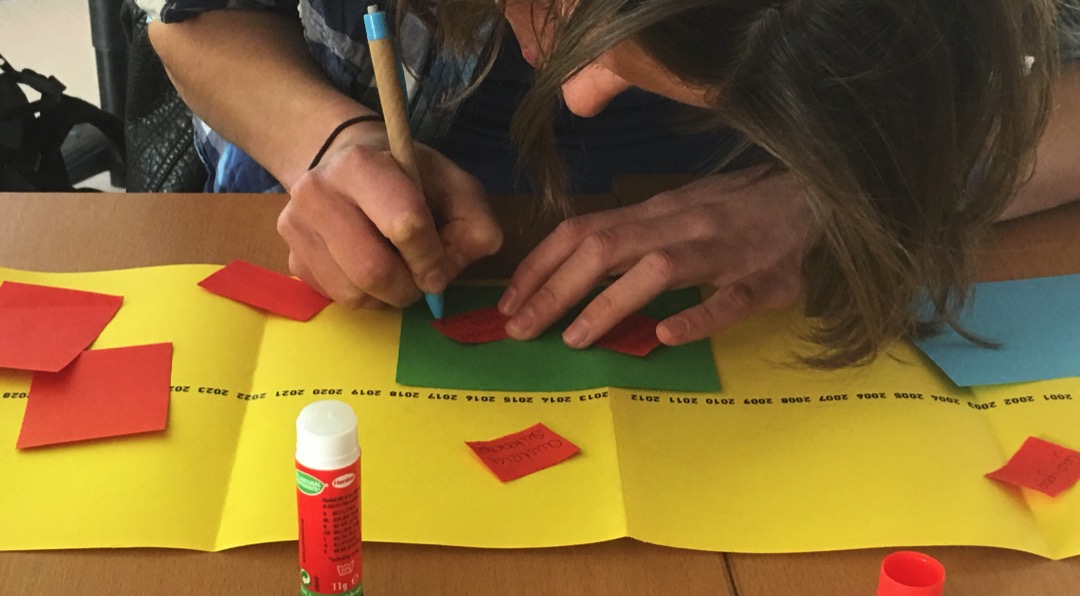
From time to time – more of less every year – a bell rings and participants pull a new card from the mixed deck of card in front of them. They may take it into consideration in their personal projection (or not if they don’t want to…)
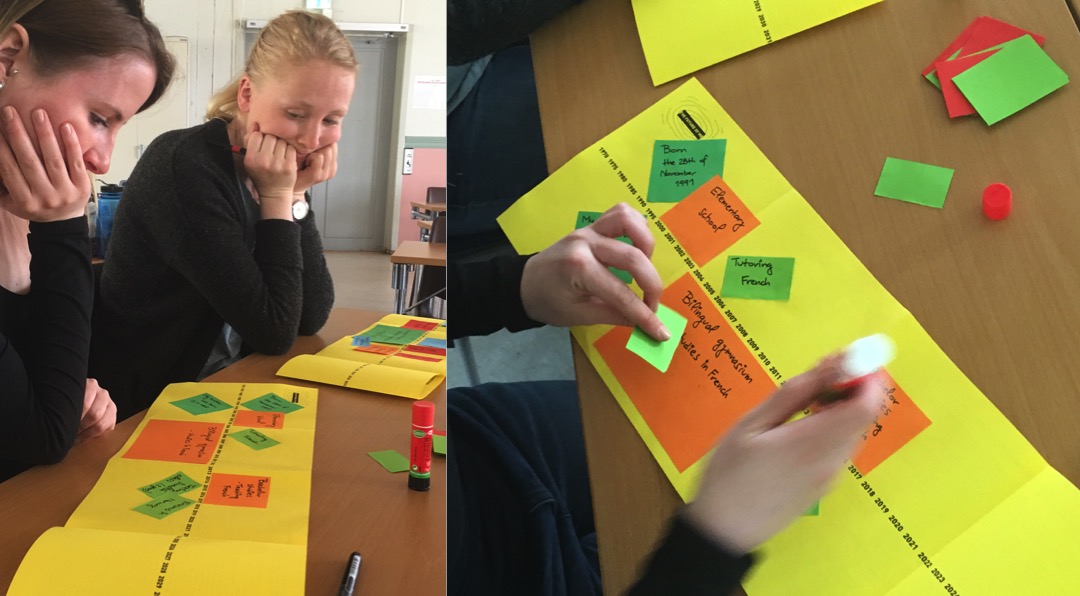
After a few minutes-years the clock stops for what foresight studies call a synchronous cut. Participants will be encouraged to share some of their personal projections in the manner of a meeting of former students who would gather again for an evening diner together after a few years of professional life. The aim is to get exchanges, mutual influences and stimulations between each other. The courses of the ones contrast with those of the others. Classic choices or original orientations influence each other.
And the clock of time restarts in its frantic rhythm. Participants build new stretches of their lives. Once again, the clock stops for a new synchronous cut: participants meet again and share the evolution of their lives. And the clock restarts. After 20, 30 or 40 years depending on whether the participants are running out of breath or are enthusiastic, the clock is definitely stopped. Everyone takes the path of their fictitious life, pin it on the wall for a “light exhibition”, look at each other projections and discuss freely.
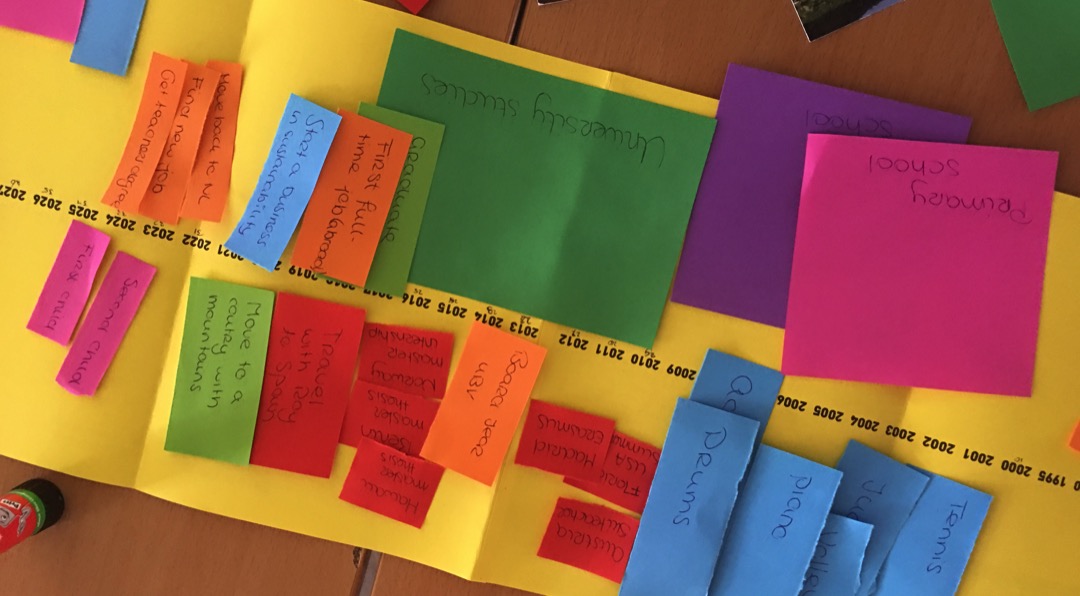
BETA-PILOT DURING THE BECOMING GLOBAL CITIZENS WEEK
We pilot the « THE FUTURE OF ME » for the first time during the Becoming Global Citizens Week organized by the PERL Centre for Collaborative Learning for Sustainable Development in Lillehammer from the 24 to the 27 of April 2017. A small group of students volunteered for a co-design session with a beta-version of the different game components.
At the end of the game participants all sat together to discuss and analyse the experience. They exchanged about the effects of this accelerated personal projection, what they confirmed or learned, what surprised them?
“…you realize how the time goes fast…”
“…some decisions (kids, house…) can affect your life for a long time…”
“…in the beginning it’s easy to imagine the next steps but the more you are far in the future, the more it becomes difficult…”
Did they already try to make a personal projection or scenario? Not at all and some were somewhat reluctant at the beginning:
“…I was a bit sceptical with the cards at the beginning but they really inspire…”
Did the participants influence each other?
“…oh yes I get stressed because all the girls had already kids and I realized it was becoming late for me…”
“…hearing others’ stories you discover things that you would have nether thought…”
“…you are influenced by what other people post on Facebook here it’s a bit the same process…”
Did they think it will influence their true future?
“…stuff may happen in your life but you realize that you can go many directions…”
“…I got a card proposing to change job but I refused…”
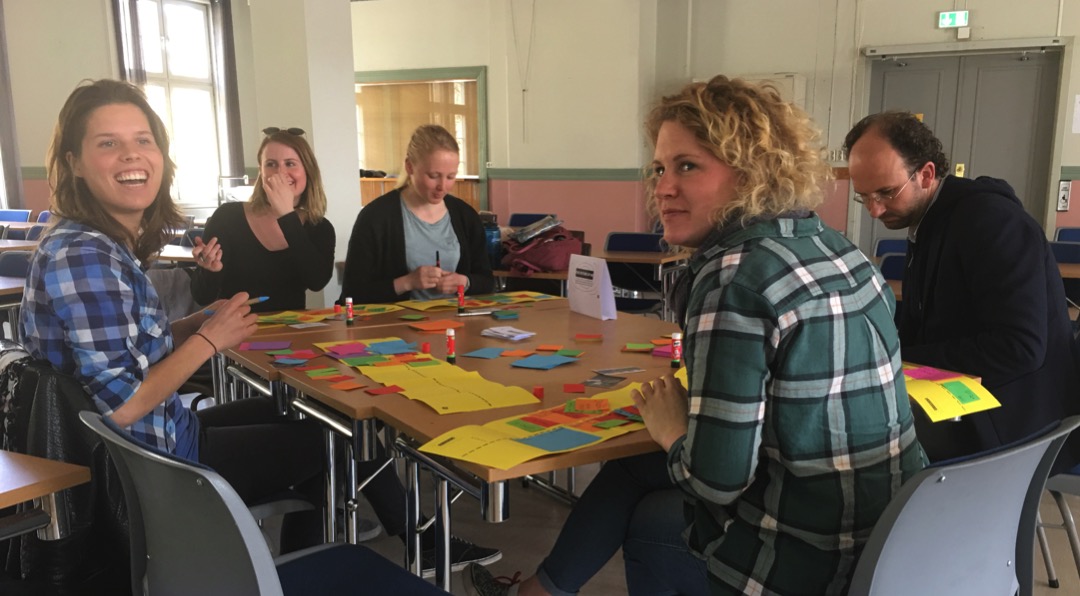
Part of the discussion with the participants and also with the PERL Centre for Collaborative Learning for Sustainable Development advisory Board investigated possible use of the exercise for educational purpose. What would be the benefits?
“…maybe the last year of high school: when you leave your A level, you are 17 or 18 and it’s difficult to find an orientation…”
“…last semester of your bachelor : you are more clear, you can explore a lot of options…”
« …in adults education it could be a good exercise to reinvent their lives and reopen opportunities… »
And what are the points of attention?
“…privacy is an issue especially with teenagers…”
« …a backcasting-like version could be explored starting from a desirable future and searching for ways to reach it. A forecasting process as it is now should be complemented with a reflexive exercise in the class to compare students scenarios and discuss values… »
What could be improved in the process was also discussed and a list of minor adjustments was made to be implemented in the next version of the « THE FUTURE OF ME ».
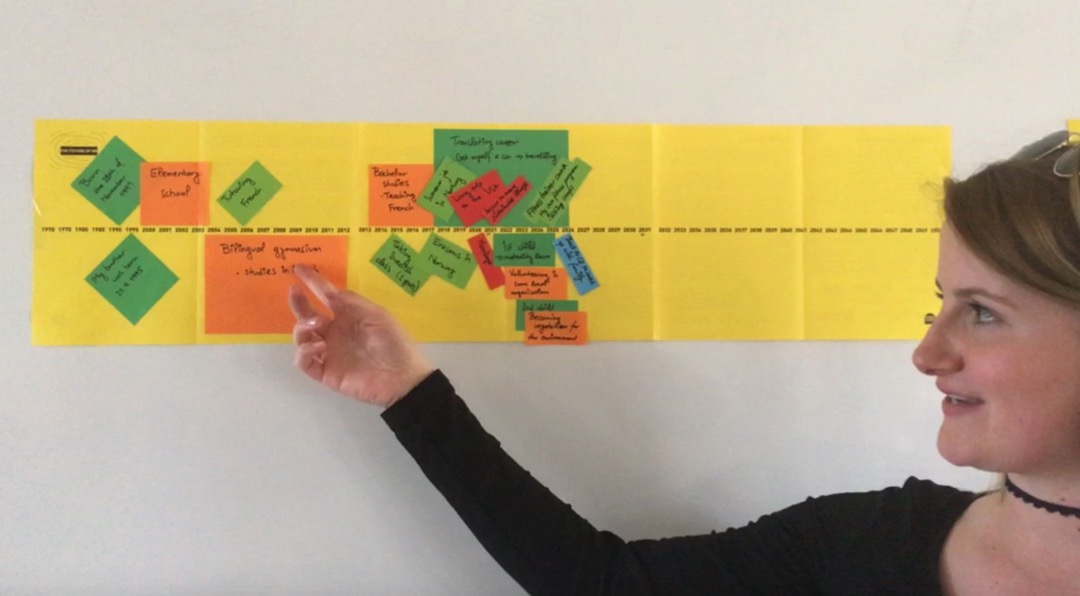
The experimentation ended with a last question: Where will you keep your timelines when you‘ll be back home? The way participants will keep the folded booklet with their scenarios (if they do so) and why and where they will keep it is certainly symptomatic of the status that such a personal projection may assume for them: is it more of a professional career planning exercise or on the contrary a private personal record? Will they check in 5 years if it was a good guess or consider it as a future nostalgic track of the past? Will they keep it in their library or rather in their photo album? We recorded in video some a the first answers and we let you discover them…
